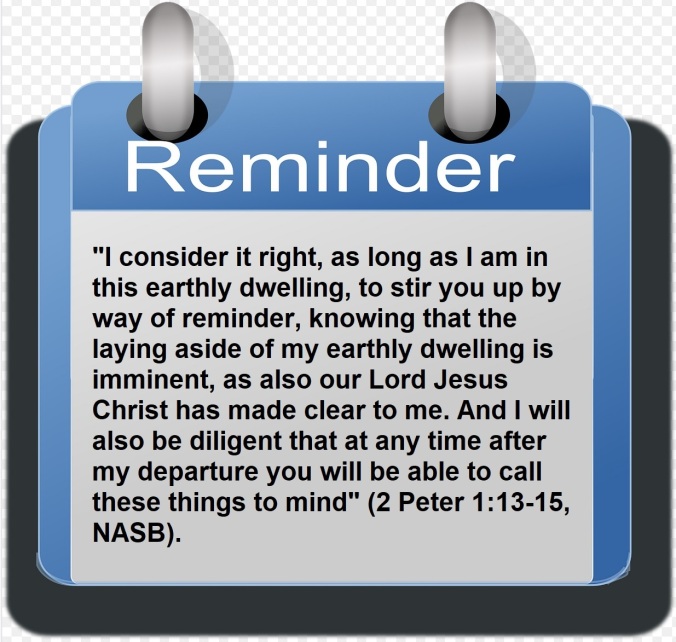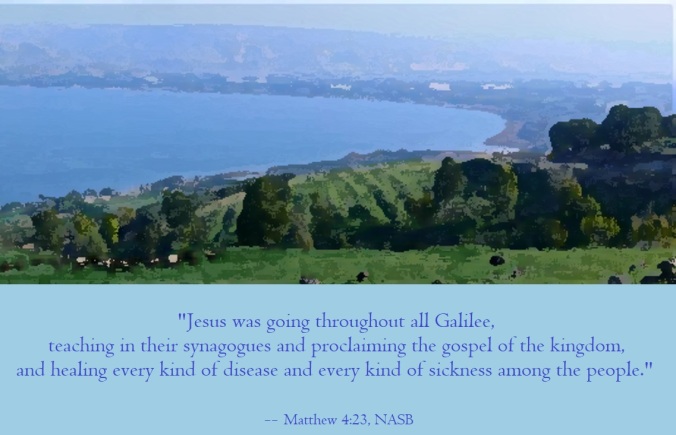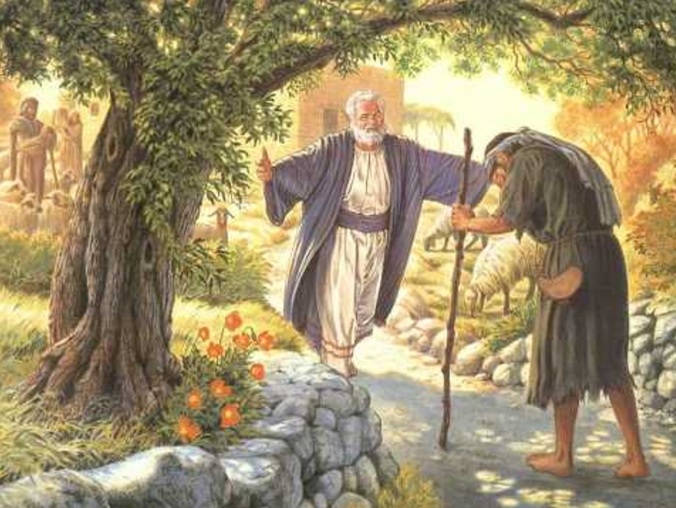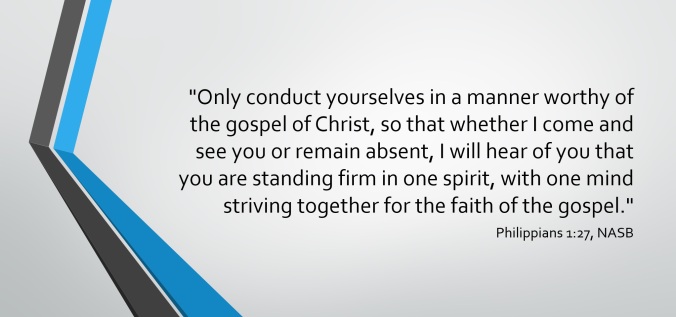“Go therefore and make disciples of all the nations…teaching them to observe all that I commanded you, and lo, I am with you always, even to the end of the age” (Matthew 28:19-20, NASB).
——————-
Contents:
1) What Is Relevant? (Robert F. Turner)
2) Understanding Expediency (Chuck Bartlett)
——————–

-1-
What Is Relevant?
Robert F. Turner
When the Pharisees continued to doubt the divinity of Christ despite obvious proof, the man who had been blind said, “Why, this is a marvelous thing, that you do not know where He is from; yet He has opened my eyes!” (Jn. 9:30).
Somehow these words came to mind recently when I was told that the church, baptism, Lord’s Supper, etc., were no longer “relevant.” And what is “relevant”? “Just be a follower of Christ, worship and obey Him.”
Why herein is a marvelous thing!! The church one reads about in the New Testament consists of those who follow the Lord. The “called out” “set apart” people (1 Peter 2:9) who have been separated from the world by virtue of this very distinction — that they are followers of Christ. And how did they become followers of Him? They obeyed the call of His gospel (2 Thessalonians 2:14, Acts 2:37-41). These are the children of God by faith in Christ Jesus, “for as many of you as have been baptized into Christ have put on Christ” (Galatians 3:26-27).
When someone answers, “I mean, just practice the sermon on the mount,” I simply turn and read some of that sermon (Matthew 5-7) and find out immediately that the excuse-maker doesn’t like that any better than he likes baptism, or other things Christ asks His followers to practice.
“Worship and obey Christ” are very empty words in the mouth of one who really means, “worship your self, and obey your own inclinations.” How can one obey Christ without giving heed to the things Christ commands? This means we have an external authority — something outside our own feelings on a given subject. We must turn to the words of Christ, the revelation of His will, and become subject thereto.
What “worship” is this that consists of things that tickle MY ears, and please MY feelings? The Lord says to partake of the bread and fruit of the vine “in remembrance of me” (1 Corinthians 11:23-f.) So — we ignore the memorial He requested, and set about establishing some sort of “Easter” festival — “because we love Him so much, and wish to worship Him.” To worship — whom??
The Pharisees could not see the truth because they did not want to see anything contrary to their selfish hypocritical ways. Following some pointed remarks by our Lord on this subject, they asked, “Are we blind also?” (John 9:40-41) And Jesus replied, “If you were blind, you would have no sin; but now you say, ‘We see.’ Therefore your sin remains.”
It is an ultra-conservative modernist(?) who makes “follow Christ” relevant today, meaning only to reduce Christ’s teachings to what he thinks important. His more modern brothers have long since dropped the idea of divine authority, and proclaim “God is Dead!”
(Brother Marshall Keeble once said, “That’s strange; I was just talking to Him this morning, and He wasn’t even sick!”)
Better give attention to His word that will judge us. THAT’S RELEVANT!
— Via Roanridge Reader, Volume 34, Issue 16, Page 3, April 21, 2019
——————–

-2-
Understanding Expediency
Chuck Bartlett
Let me start by saying that this is a Biblical lesson. The concept of expediency is taught in God’s word and it is vital that we understand what it means. We shall first start with the apostle Paul speaking on this when he wrote, “All things are lawful for me, but all things are not expedient: all things are lawful to me, but all things edify not” (I Cor. 10:23). The word expedient means to be helpful; however, not all things are helpful.
The easiest way to understand what is considered expedient would be the place of worship. Local churches are required to assemble on the first day of the week to worship God (Acts 20:7; I Cor. 16:1-2; Heb. 10:25, etc.). The scriptures reveal that brethren set up a time and place for them to fulfill the Lord’s desire (I Cor. 11:17-18). Knowing that it is expedient for the brethren to rent or purchase a place to assemble, there are many factors that need to be taken into consideration.
Would it really be in the best interest of a local church consisting of two families to go out and build a million dollar facility? The answer is obvious – no, this would not be helpful. Having a place to meet is expedient, but there are times wisdom dictates that something that is lawful, in and of itself (finding a place to meet) can be the wrong thing to do.
The same thing can be said for a congregation that wants to evangelize. It’s an expedient to use TV as a tool to share the gospel. But if a local church cannot afford to fund such an effort, it would be unwise to engage in it. This is why the Lord Jesus stated clearly the need for His followers to use “righteous” judgment (Jn. 7:21-24).
Keep in mind that expediency is not some sort of loophole for the local church to do whatever they want with church funds. Staying with the discussion of the church building: it’s one thing to rent or buy, it’s another matter altogether for a church to rent or buy a meeting place to use it for social events. It’s the lack of discernment that has opened the door for religious groups to use the building for a daycare, Boy Scout meeting place, providing chicken dinners and celebrating birthdays and anniversaries. Folks, these do not fall under the area of expediency. They fall under the realm of being unscriptural.
The best way to clear this up is by looking at two passages of scripture. First, in I Corinthians 11:22, after rebuking the brethren for turning the Lord’s Supper into some sort of meal, Paul said, “What! Do you not have houses to eat and drink in? Or do you despise the church of God and shame those who have nothing? What shall I say to you? Shall I praise you in this? I do not praise you.” Now, before we examine this, let’s now note a text in Romans 16, where Paul speaking about Priscilla and Aquila, mentioned, “Likewise greet the church that is in their house” (vr. 5).
Now, can brethren have social events in their own homes? Of course they can. I don’t know where the brethren were meeting when they were rebuked by Paul for turning the Lord’s Supper into a feast. Could they have been meeting in someone’s home? Possibly. Even so, does that mean the apostle could not have said what he did in I Corinthians 11? Not at all. Brethren could just as easily turn the Lord’s Supper into a feast even if meeting in someone’s home. The fact is, the church comes together to worship God His way (Jn. 4:24). When brethren have finished their worship, the brother and sister can now go back to the regular use of the home and even be hospitable (Rom. 12:13).
When brethren own a church building, it was bought with the purpose for which it is to be used. The local church doesn’t use its funds to build a kitchen or gymnasium onto the meeting place. Why not? It’s because it isn’t expedient. It doesn’t aid in worshipping God. In other words, it is not a help, it’s a hindrance. You don’t mix the two. Those who don’t understand expediency fail to see the error in using their church building for whatever use they see fit. This doesn’t respect the word of God.
— Via bulletin articles of the River Ridge church of Christ, January 26, 2019
——————–
The Steps That Lead to Eternal Salvation
1) Hear the gospel, for that is how faith comes (Rom. 10:17; John 20:30-31).
2) Believe in the deity of Christ (John 8:24; John 3:18).
3) Repent of sins (Luke 13:5; Acts 17:30).
4) Confess faith in Christ (Rom. 10:9-10; Acts 8:36-38).
5) Be baptized in water for the remission of sins (Mark 16:16; Acts 2:38; 22:16; Rom. 6:3-4; Gal. 3:26-27; 1 Pet. 3:21).
6) Continue in the faith, living for the Lord; for, if not, salvation can be lost (Heb. 10:36-39; Rev. 2:10; 2 Pet. 2:20-22).
——————–
Tebeau Street
CHURCH OF CHRIST
1402 Tebeau Street, Waycross, GA 31501
Sunday services:9:00 a.m. (Bible class); 10 a.m. & 5 p.m. (worship)
Wednesday: 7 p.m. (Bible class)
evangelist/editor: Tom Edwards (912) 281-9917
Tom@ThomasTEdwards.com
http://thomastedwards.com/go (Older version of Gospel Observer website without pictures, but back to March 1990)
http://tebeaustreetchurchofchrist.org/
http://ThomasTEdwards.com/audioser.html (audio sermon)





